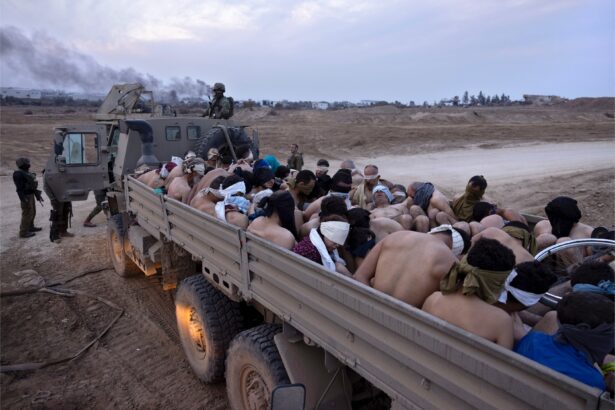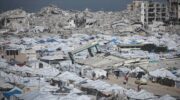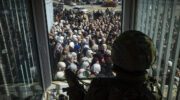Testimonies obtained from released detainees indicate that Israel continues to commit horrific crimes, including torture, inhumane and degrading treatment, against thousands of Gazans detained and held incommunicado in undisclosed locations, some for over four months. Unlawfully detained persons have been stripped naked and photographed and otherwise humiliated by IDF forces. They have been sexually assaulted, attacked by dogs, beaten, starved, burned with cigarettes and denied legal representation. Human rights experts fear that detainees face summary execution in sites where conditions are chillingly similar to those established by US forces in Abu Grahib and elsewhere.
By Diane Paul. 12 February 2024
Ramallah, West Bank, Palestine
Numerous Palestinian and international human rights organizations, UN agencies and news sources report that following the events of October 7, 2023, Israeli forces and prison guards have arbitrarily detained thousands of Gazans in secret locations under circumstances referred to by human rights experts as “enforced disappearance.” Estimates of the number of “disappeared” range between 1000 and 5000, but rights groups say no one knows the true number.
“Enforced disappearance” is a legal term referring to “the arrest, detention, abduction or any other form of deprivation of liberty by agents of the State…followed by a refusal to acknowledge the deprivation of liberty or by concealment of the fate or whereabouts of the disappeared person, which places such a person outside the protection of the law.”
Since December 2023, international reporting on the disappearances has been relatively limited, with little new information coming to light. Recent threats by the Israeli government to enter Rafah and conduct ground operations there raises the spectre of further mass enforced disappearances.
Al Jazeera reported in late October that thousands of workers from Gaza employed in Israel when the war started have gone missing “amid a campaign of mass arrests.” Palestinian Minister of Labor Nasri Abu Jaish told The Independent that some 4500 Gazans registered to work in Israel were missing; another labor leader claimed the number was closer to 5000. (Israel revoked work permits for Gazans just a few days after October 7th).
The UN Office of the High Commissioner for Human Rights (OHCHR) has also received “numerous disturbing reports from the north of Gaza of mass detentions, ill-treatment and enforced disappearance of possibly thousands of Palestinian men and boys, and a number of women and girls, at the hands of Israeli Defense Forces (IDF). Most were rounded up as they were attempting to move south or were taken during operations conducted on their homes, hospitals, schools and other places of refuge.”
Family members told The Washington Post in early December that “they saw relatives with no ties to Hamas or armed groups led away by Israeli soldiers at gunpoint and have heard nothing from them since.” Eyewitnesses said they heard some soldiers saying that the detainees would be transferred to the “Zikim” area, north of the Gaza Strip.
Israeli military forces stormed the Beit Lahia area on December 9th and detained hundreds of Palestinians present in the area.
Euro-Med Human Rights Monitor reported on 26 December that nearly 3000 Palestinian civilians had recently been kidnapped from homes and shelters and remained missing. “Over the past few days,” Euro-Med stated, “the Israeli army has been detaining hundreds of Palestinians, including women, in the Sheikh Radwan neighbourhood in Gaza City.” The organization also claimed that “hundreds of additional civilians were arrested in Jabalia al-Balad and its camp, north of Gaza, and in the neighbourhoods east of Gaza City, where they were subjected to the same inhumane policy by members of the Israeli military.”
A number of prominent individuals as well as persons with US and Canadian citizenship have been detained without charge and remain missing; among them:
- Two officials from the Al Amal hospital in Southern Gaza, Dr. Haider Al Qudra (General Manager) and Maher Attalah (Administrative Director), both disappeared after being summoned by the Israeli military, according to the Palestinian Red Crescent Society.
- 36 medical workers doctors, nurses and ambulance drivers (reported by the Gaza Health Ministry to The Washington Post) from the Al-Shifa Hospital. Among the detained medical staff is Al-Shifa Hospital Director Mohamed Abu Salmiya, who the IDF says allowed Hamas to use bunkers underneath the hospital as a command center, an allegation denied by the Ministry and medical staff.
- Nidal Suhali al-Waheidi (an internationally acclaimed photojournalist from the Al Najah Channel) and Haitham Abdelwahed/Abdelwahid (Ain Media Agency), both from the occupied Gaza Strip. According to Amnesty International, they were detained by Israeli forces on 7 October while reporting the Hamas-led attack and “are held in conditions constituting enforced disappearance. Since then, Israeli authorities have refused to disclose their whereabouts or the legal grounds and reasons for their arrest.”
The Israeli Supreme Court has since denied an appeal to disclose their fates, stating in a response to a petition filed by Israeli human rights organization HaMoked that “Israel held no obligation towards residents of the Gaza Strip, given that it was a territory controlled by a terrorist organization and did not establish what were the legal framework and duties incumbent on Israel in holding Gazans.”
- Borak Alagha, 18, and Hashem Alagha, 20 (brothers and US citizens) and their father, a Canadian citizen, were detained on February 8th, 2024. According to family members interviewed by PBS, “Soldiers tied up and blindfolded the women and children in the family and placed them outside the home.” A mentally disabled uncle and two other adult male relatives were also taken away by the Israelis and remain missing. Other adult male relatives of the Alagha family were also detained, along with men of a neighboring household, for a total of about 20 detained.
- Human rights defender and head of Al Awda Hospital Ahmed Muhanna was forcibly disappeared by Israeli military forces from the hospital on 17 December 2023 at approximately 1 pm in the Northern Gaza Strip. Frontline Defenders reported that “The situation intensified on the day following the unlawful detentions when Israeli forces returned to the hospital, bringing the human rights defender with them. Subsequently, 11additional people were unlawfully detained, including 5 staff members, and Muhanna was again taken to an unknown location.”
Reports of Summary Executions during and after Military Operations
Euro-Med Human Rights Monitor conducted a comprehensive analysis of dozens of testimonies and video clips that revealed cases of summary executions. “Israeli forces frequently blow up doors and throw bombs during their raids of Palestinian homes and shelter centers…[the IDF] then storm the buildings to shoot, execute, and kill everybody inside—either for no apparent reason, or for ‘crimes’ as simple as two civilians speaking with each other. They later force any survivors out of the homes or shelters, forcing the men to strip completely naked while the women are searched and harassed.”
The Palestine Prisoner’s Association (PPA) noted with alarm that aside from the occupation’s confession to having executed one Gaza detainee, two Gazan workers were killed in detention and several detainees in the army Sde Teman camp near Beersheba died under mysterious circumstances. The identity of only one of the two workers was revealed by the occupation.
Reports of Torture, Inhumane and Humiliating Treatment
Front Line Defenders has described the process of the mass detention of persons, among them human rights defenders, as beginning with the separation of families. Men are often stripped of their clothing. Then their hands are bound and they are blindfolded before being forced into the backs of trucks that transfer them to detention camps, where they endure further ill-treatment, hunger and cold. Photos and videos published on social media depicted Palestinian men being paraded in the streets, heads bowed, while others showed Israeli military trucks carrying detainees in the same degrading conditions. [This scenario is horrifically identical to occurrences documented in Bosnia during ethnic cleansing 30 years ago by this writer. What often came next: torture, starvation and summary executions].
Amnesty International’s International Crisis Evidence Lab has verified “photos and video footage [that] show Israeli forces’ inhuman and degrading treatment of detainees in Beit Lahia, a city in northern Gaza.”
A human rights lawyer in Ramallah provided video footage compiled through searches of social media, much of it posted by IDF soldiers.
Translation: Video| They were extinguishing cigarettes on the bodies of prisoners.. Testimony of a Palestinian from the Gaza Strip who was released by the Israeli occupation after being detained for more than 50 days. He recounts the details of the “horrific” torture he experienced with a number of other detainees.
OHCHR has reported that many detainees have been subjected to serious ill-treatment, which in some instances may amount to torture: they were “forced to strip down to their underwear, were blindfolded and tightly handcuffed, and were filmed and photographed in deliberately humiliating positions prior to being transported, without their clothing and with little food or water, to unknown places of detention…Credible information has also been received that approximately 140 women and girls have been arbitrarily detained and are currently being detained in undisclosed locations.” Families of detainees have not been provided any information on the fate or location of their loved ones or any reasons for their detention—exacerbating their sense of anguish and fear.”
Women from Sheikh Radwan were taken to Yarmouk Stadium, says Euro-Med, “where they had their veils removed and were searched by soldiers…[and also] also endured explicit abuse, beatings, and harassment…many were threatened with rape. One detained woman (later released) was transported in an Israeli military truck alongside a group of naked men…Palestinian males, including children as young as 10 years old and elderly people over the age of 70, were forced to take off all of their clothes except their underwear and line up in a humiliating manner in front of the women detained in the same stadium.”
A member of the rights group Al Haq in Ramallah stressed that Israel has also refused to return the bodies of the dead to families.
Denial of Legal Representation
The Israeli Knesset approved an extension of an emergency order that allows Israeli authorities to deny detained Palestinians from Gaza the option to meet with lawyers, a move strongly condemned by PPS. The order, which allows Israel to prevent prisoners from meeting with a lawyer for up to 180 days, was extended for an additional four months. This enables the occupation to carry out further crimes without any oversight. PPS claims the Israeli government is using the order as a cover to commit further crimes.
Palestinian lawyers who previously had access to prisoners at Ofer are now not permitted to visit anyone, including detainees from the West Bank. As far as is known, only one lawyer has had any access to Gazan detainees.
Denial of Red Cross Access to Detainees
To date, no access to detainees has been granted to any organization, including the International Committee of the Red Cross (ICRC), which states it has not had access to places of detention in Israel since October 7, 2023, despite repeated requests to the Israeli government. In another serious development, ICRC, previously able to visit detainees from the West Bank, is now barred from all detention facilities. (An estimated 6500 Palestinians from the West Bank have been detained since October 7th; at least 3000 are being held under administrative detention without charges made or release dates).
ICRC has also been denied access to Israeli hostages/IDF prisoners held by Hamas.
According to International law, offers by ICRC to visit persons deprived of their liberty must be examined in good faith and may not be arbitrarily refused. Registration of detainees by ICRC can serve to prevent extra-judicial executions, torture and other cruel, inhuman or degrading treatment or punishment. ICRC monitors conditions of detention, ensures family members are informed of the whereabouts of loved one and works to arrange resumption of contact between family members.
Under normal circumstances, families of detained or missing persons can file tracing requests via national Red Cross or Red Crescent Societies or ICRC, but given conditions in Gaza, it is impossible for families to make such requests. Not only is this extremely traumatizing for families who have no idea where their loved ones are, it makes it much more difficult to determine the number of persons missing.
So where are the Gazan detainees?
Human rights activists working on prisoner rights interviewed in Ramallah this week say no one knows the location of many detention sites, although some have been identified through reports from released prisoners and forensic evidence gathered via social media.
In December, representatives from The Commission for Ex-Prisoners’ Affairs, the Palestinian Prisoners’ Club and the Addameer Foundation for Prisoners Care and Human Rights told Middle East Monitor that “Several hundred detainees from Gaza are believed to be detained in sections 23 and 25 in Ofer Prison, where many detainees from the West Bank are held.” Ex-detainees also told the rights groups that “Israeli guards carry out horrific crimes and degrading treatment against detainees from Gaza, including asking them to bark like dogs before giving them meals, and demanding they sing pro-Israel songs in a loud voice, adding that they could clearly hear their screams around the clock as a result of the torture and abuse meted out against them.”
Many Gazan detainees were laborers present in Israel on October 7th who did not participate in any hostilities. Those who have been released were sent back to Gaza though the Karm Abu Salem crossing and left to walk long distances in great danger to search for family members whose whereabouts are unknown. It has not been possible to reach them to do detailed interviews due to war conditions.
Female detainees from the West Bank held in Damon prison similarly reported that women from Gaza are held separately there and “were heard screaming in other parts of the prison.”
One worker told Israeli human rights group HaMoked (as reported by TruthOut) that he was held in a roofless cage, exposed to the sun and deprived of water, food and toilet access for three days. He was then “moved to a 300 square meter camp in which hundreds of fellow day laborers were forced to share one toilet. He was beaten and cursed at by Israeli guards when he asked to contact the Red Cross.”
Some female detainees have reportedly been held at Anatut Military Base under tent canopies in the open air, sleeping on mattresses on the ground, said a worker with Adameer. The past several weeks have been marked by cold weather and rain.
Advocates have called upon the international community to pressure Israel to release those held arbitrarily, reveal the names and fate of all detainees; stop the arbitrary arrest and detention of Gazans during operations in Gaza and end the torture and humiliation of detainees.
In addition, human rights experts say, governments must insist that the Israeli government provide immediate and unrestricted access to all detainees by the International Committee of the Red Cross.
Diane Paul is a human rights researcher/activist and a licensed clinical social worker whose work has primarily focused on the protection of civilians in armed conflict, with over thirty years’ experience. She has particular interest in the protection of civilians in armed conflict, protection of marginalized children, immigrant rights and tracing/restoring family links for families separated by armed conflict. She has extensive experience in human rights monitoring and reporting; legal observing and working with persons who have experienced trauma as the result of armed conflict and gender-based violence.
Her fieldwork and research have taken her to numerous countries, including Palestine, Bosnia, Chad, Pakistan, Uganda, Democratic Republic of the Congo, Liberia, Burundi, Sri Lanka, Somalia, South Africa, Malaysia, Colombia, India, Bangladesh, Turkey, Thailand, Nepal, Russian Federation, Croatia, Serbia, Kosovo, etc. She has written extensively on protection and human rights (for example, this, this, this this, this, this).
She served as the first Director of the American Red Cross Holocaust and War Victims Tracing and Information Service [1990] and witnessed the trauma of families separated due to armed conflict. People never stop looking for their loved ones lost in war; the pain of not knowing can never be assuaged.
RELATED READING:
- Israel’s torture and humiliation of female and male Gazan prisoners
- Israel holds thousands of Palestinian prisoners in solitary confinement despite health risks
- When will Israel stop torturing Palestinian prisoners?
- Why were these Palestinian prisoners willing to die of starvation?
- Torture of Palestinian prisoners: Time to end Israel’s impunity
- Palestinian child prisoners face further repression and transfer
- Human rights reports on Israel-Palestine (regularly updated)





